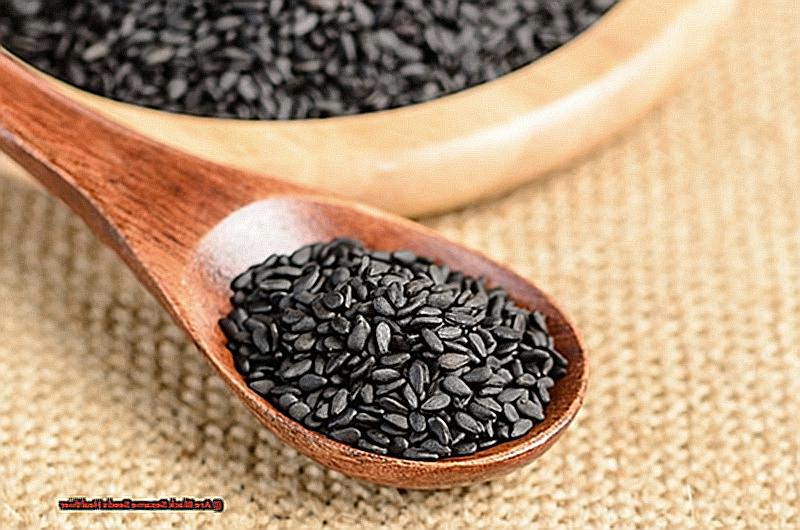
If you’ve ever wondered about the hidden nutritional gems tucked away in these tiny, mysterious seeds, then you’re in for a treat. Get ready to embark on a journey into the captivating realm of black sesame seeds and uncover why they might just be the ultimate choice for your well-being.
With their unique flavor and deep hue, these little powerhouses have been cherished in traditional Asian cuisine for centuries. But are they truly superior to their pale white counterparts?
So grab yourself a steaming cup of tea, settle into your comfiest chair, and let’s dive headfirst into the enchanting world of black sesame seeds.
Are black sesame seeds healthier
Contents
- 1 Are black sesame seeds healthier
- 2 Nutritional Comparison: Black vs White Sesame Seeds
- 3 Antioxidant Content: The Health Benefits of Black Sesame Seeds
- 4 Vitamin E: Promoting Healthy Skin, Hair, and Immune System
- 5 Mineral Powerhouse: Calcium, Iron, Magnesium, and Zinc in Black Sesame Seeds
- 6 Fiber for Digestion and Blood Sugar Regulation
- 7 Lignans: Potential Health Benefits of Black Sesame Seeds
- 8 Incorporating Black Sesame Seeds into Your Diet
- 9 Conclusion
Black sesame seeds versus white sesame seeds – it’s a debate that has sparked curiosity among health-conscious individuals. But are black sesame seeds really healthier than their white counterparts? Let’s dive into the research and figure out if these tiny seeds pack a nutritional punch.
Antioxidant Powerhouses
One of the main reasons why black sesame seeds are often considered healthier is their higher antioxidant content. Antioxidants are essential for fighting off free radicals and protecting our bodies from oxidative damage, which can lead to chronic diseases. Black sesame seeds contain more antioxidants than white sesame seeds, making them a great addition to your diet.

Lignans for Health
Black sesame seeds also boast a higher concentration of lignans compared to white sesame seeds. Lignans are plant compounds that have been linked to various health benefits, including reducing inflammation, supporting heart health, and potentially even preventing certain types of cancer. So if you’re looking for an extra boost of these beneficial compounds, black sesame seeds are the way to go.
Phytosterols for Cholesterol Control
In addition to lignans, black sesame seeds contain higher levels of phytosterols compared to white sesame seeds. Phytosterols are plant compounds that resemble cholesterol and can help lower cholesterol levels in the body. Incorporating black sesame seeds into your diet can be a natural way to support heart health and maintain healthy cholesterol levels.
Nutrition Showdown
While black sesame seeds may have some nutritional advantages, it’s important to note that both black and white sesame seeds are highly nutritious. White sesame seeds still provide a good source of healthy fats, protein, fiber, vitamins, and minerals. So don’t ditch the white variety just yet – they have their own unique nutritional profile.
Moderation is Key
When it comes to incorporating black sesame seeds into your diet, remember that moderation is key. While they offer health benefits, black sesame seeds are calorie-dense and should be consumed as part of a balanced diet. Sprinkle them on salads, blend them into smoothies, or use them as a garnish to add depth and richness to your dishes.
The Verdict
Black sesame seeds may offer some additional health benefits compared to white sesame seeds due to their higher antioxidant content, lignans, and phytosterols. However, it’s important to remember that both varieties are nutritious and can be enjoyed as part of a healthy diet. So whether you prefer the nutty flavor of black sesame seeds or the milder taste of white sesame seeds, feel free to sprinkle them on your favorite dishes and reap the nutritional rewards.
Nutritional Comparison: Black vs White Sesame Seeds
Sesame seeds are a versatile ingredient used in various cuisines around the world. They come in two main varieties: black and white. While both types offer a range of nutritional benefits, they do have some slight differences. In this article, we will explore the key factors that set black and white sesame seeds apart, including their antioxidant content, lignan levels, calcium content, and taste.
Antioxidant Content:
Black sesame seeds are known for their higher antioxidant content compared to white sesame seeds. Antioxidants play a crucial role in protecting our bodies from damage caused by harmful free radicals. Including black sesame seeds in your diet can help boost your antioxidant intake and promote overall health.
Lignan Levels:
Lignans are plant compounds that act as phytoestrogens and have been associated with various health benefits. Black sesame seeds contain higher levels of lignans compared to white sesame seeds. These compounds have shown potential for reducing the risk of certain cancers and improving heart health.
Calcium Content:

White sesame seeds are often considered a good source of calcium. They contain slightly higher levels of calcium compared to black sesame seeds. Calcium is essential for maintaining strong bones and teeth, as well as for proper muscle and nerve function.
Taste:
When it comes to taste, black sesame seeds have a slightly stronger and nuttier flavor compared to white sesame seeds, which have a milder taste. The flavor profile of black sesame seeds can add depth and richness to various dishes, while white sesame seeds provide a more subtle flavor.
Here’s a breakdown of the key differences between black and white sesame seeds:
| Nutrient | Black Sesame Seeds | White Sesame Seeds |
|———————–|——————–|——————–|
| Antioxidant Content | High | Moderate |
| Lignan Levels | High | Moderate |
| Calcium Content | Moderate | High |
| Taste | Strong and Nutty | Mild |
Antioxidant Content: The Health Benefits of Black Sesame Seeds
As an expert on the antioxidant content and health benefits of black sesame seeds, I am here to shed some light on why these tiny seeds are a nutritional powerhouse. Packed with antioxidants, black sesame seeds offer a range of health benefits that can contribute to overall well-being.
Antioxidant Powerhouse
Black sesame seeds are known for their high antioxidant content, which helps protect the body against damage from harmful free radicals. These compounds play a crucial role in maintaining overall health and preventing diseases like heart disease, cancer, and premature aging.
Phenolic Compounds
The antioxidant content of black sesame seeds is mainly attributed to their high levels of phenolic compounds, specifically lignans and phenolic acids. Lignans are plant compounds that have been found to exhibit strong antioxidant activity. They not only reduce inflammation but also improve cholesterol levels and support liver function.
Anti-Inflammatory and Anticancer Properties
Phenolic acids, another group of antioxidants found in black sesame seeds, have been shown to possess anti-inflammatory and anticancer properties. They protect against oxidative stress and contribute to overall well-being.
Vitamin E and Sesaminol
Apart from lignans and phenolic acids, black sesame seeds also contain other antioxidants such as vitamin E and sesaminol. These compounds further enhance the overall antioxidant capacity of the seeds, promoting better health.
Skin Health Benefits
The antioxidant content of black sesame seeds may contribute to improving skin health and preventing signs of aging. By neutralizing free radicals that damage skin cells, black sesame seeds can help combat wrinkles, age spots, and other signs of aging.
Cardiovascular Health Support
The combination of antioxidants and essential fatty acids present in black sesame seeds may promote cardiovascular health. By reducing inflammation, improving blood lipid profiles, and preventing the oxidation of LDL cholesterol, these seeds contribute to a healthier heart.
Vitamin E: Promoting Healthy Skin, Hair, and Immune System
Are you looking for a natural way to achieve that flawless complexion, luscious locks, and a robust immune system? Look no further than the mighty vitamin E. This little gem is here to save the day and boost your overall well-being. Let’s dive right in and explore how this nutrient works its magic.
Protects Your Skin from the Inside Out
When it comes to healthy skin, vitamin E is your ultimate ally. Acting like a shield, it helps protect your skin cells from damage caused by those pesky free radicals. With its antioxidant powers, vitamin E fights off environmental stressors and keeps your skin looking fresh and youthful.
Moisturizes and Nourishes Your Skin
Say goodbye to dry, flaky skin. Vitamin E is a natural moisturizer that works wonders on your skin’s hydration levels. It penetrates deep into the layers, locking in moisture and leaving your skin soft, supple, and oh-so-kissable.
Shields Your Skin from Harmful UV Rays
We all know how damaging those sun rays can be. But fear not. Vitamin E has got your back (and your face.). It acts as a natural sunscreen by absorbing harmful UV rays before they wreak havoc on your delicate skin. So slather on that SPF-infused moisturizer and let vitamin E shield you from sunburns and premature aging.
Reduces Scars and Fine Lines
Bid farewell to those unwelcome reminders of past breakouts or accidents. Vitamin E has the power to fade scars and minimize the appearance of fine lines. Its regenerative properties help speed up the healing process and promote the growth of healthy skin cells.
Promotes Hair Growth and Health
Dreaming of long, luscious locks? Vitamin E can make that dream a reality. By improving blood circulation to the scalp, this nutrient stimulates hair growth and prevents hair loss. It also strengthens your hair follicles, making them less prone to breakage and split ends. So get ready to flip your luxurious mane with confidence.
Boosts Your Immune System
Your immune system works hard every day to keep you healthy and protected. But it could use some support, right? Vitamin E steps in as the perfect sidekick, enhancing the activity of those mighty white blood cells that fight off infections and diseases. With a strong immune system, you’ll be ready to take on whatever life throws your way.
Now that you know all about the superhero powers of vitamin E, let’s talk about how to incorporate this nutrient into your daily routine. One simple way is by adding black sesame seeds to your diet. These tiny powerhouses are rich in vitamin E, making them an excellent natural source of this essential nutrient.
Mineral Powerhouse: Calcium, Iron, Magnesium, and Zinc in Black Sesame Seeds
Black sesame seeds are the unsung heroes of the mineral world. Packed with essential nutrients like calcium, iron, magnesium, and zinc, these tiny seeds deserve a standing ovation for their mineral prowess. Let’s dive into the importance of these minerals and why black sesame seeds should be on your radar.
Calcium, the building block of strong bones and teeth, is often associated with dairy products. However, did you know that black sesame seeds are also an excellent source of calcium? With each serving of black sesame seeds, you’ll be getting a calcium boost to support bone health and proper muscle and nerve function. As someone who has struggled with weak bones in the past, incorporating black sesame seeds into my diet has been a game-changer.
Iron is another mineral that black sesame seeds excel in. For those following a plant-based diet or dealing with iron deficiency, these little powerhouses can be a lifesaver. Iron plays a crucial role in the production of hemoglobin, which carries oxygen throughout our bodies. By including black sesame seeds in your meals, you’ll be giving your body the iron it needs to thrive.
Magnesium, often overlooked but oh-so-important, is abundant in black sesame seeds. This mineral is involved in energy production, muscle and nerve function, and maintaining heart health. I’ve personally noticed an increase in energy levels since adding black sesame seeds to my morning routine. It’s like having a natural energy booster without any jitters or crashes.
Last but not least, zinc is a mineral that shouldn’t be underestimated. It’s essential for immune function, wound healing, and DNA synthesis. Black sesame seeds contain a good amount of zinc, making them a smart choice for immune support and healthy skin. Plus, who doesn’t want glowing skin?
Incorporating black sesame seeds into your diet is easy-peasy. You can sprinkle them on top of salads, blend them into smoothies, or use them as a crunchy topping for yogurt or oatmeal. The possibilities are endless, and your taste buds will thank you.
Remember, moderation is key. While black sesame seeds are a nutrient-dense food, it’s important to consume them as part of a balanced diet. Too much of anything can throw off your nutrient balance or lead to excessive calorie intake. So sprinkle away, but do so mindfully.
Fiber for Digestion and Blood Sugar Regulation
Today, we’re diving deep into the world of fiber and its incredible benefits for digestion and blood sugar regulation. In this blog post, we’ll explore how black sesame seeds, with their mineral prowess, can be a game-changer for your overall health. So, let’s get started.
Fiber for Digestion:
- Fiber acts as a natural bulking agent, promoting regular bowel movements and preventing constipation.
- Black sesame seeds, being a good source of dietary fiber, provide roughage that aids in the movement of food through the intestines.
- Including black sesame seeds in your diet can support healthy digestion and ensure your digestive system functions properly.
Fiber for Blood Sugar Regulation:
- Consuming foods high in fiber, like black sesame seeds, slows down the absorption of sugar into the bloodstream.
- This gradual release of sugar helps prevent spikes in blood sugar levels.
- Individuals with diabetes or those at risk of developing it can benefit from incorporating black sesame seeds into their diet.
Fiber for Weight Management:
- High-fiber foods tend to be more filling and keep us satisfied for longer periods.
- By including black sesame seeds in your diet, you can potentially curb cravings and maintain a healthy weight.
- However, remember to consume black sesame seeds as part of a balanced diet that includes other nutrient-rich foods.
Expert Tips and Considerations:
- Black sesame seeds should be consumed within the context of a varied and balanced diet.
- Individuals with certain digestive conditions or sensitivities may need to monitor their fiber intake and consult with a healthcare professional for personalized guidance.
So there you have it, folks. Black sesame seeds are not only mineral powerhouses but also offer significant benefits for digestion and blood sugar regulation.
By adding these little wonders to your diet, you can support healthy bowel movements, regulate blood sugar levels, and potentially manage your weight. Remember, moderation and balance are key. Stay tuned for more exciting insights on nutrition and wellness.
Lignans: Potential Health Benefits of Black Sesame Seeds
Are you looking for a natural way to support your hormone balance, reduce the risk of certain diseases, and promote overall health? Look no further than black sesame seeds. These tiny seeds are not only delicious but also packed with lignans, a group of compounds that have been gaining attention for their potential health benefits.
Let’s dive into the world of lignans and discover why black sesame seeds are a must-have in your pantry.
Hormone Balance: A Key Benefit of Lignans
One of the standout properties of lignans is their ability to act as phytoestrogens. Phytoestrogens are plant compounds that mimic the effects of estrogen in the body. For women going through menopause, this can be particularly beneficial as lignans may help alleviate symptoms such as hot flashes and night sweats. By binding to estrogen receptors, lignans help regulate hormonal activity and promote balance in the body.
Antioxidant Power: Protecting Cells from Oxidative Stress
Lignans also possess powerful antioxidant properties. Antioxidants play a crucial role in protecting the body against oxidative stress, a process that damages cells and contributes to aging and various diseases. By neutralizing harmful free radicals, antioxidants help reduce inflammation and promote overall health. Incorporating black sesame seeds into your diet can provide you with a natural source of antioxidants to support your well-being.
Cancer Prevention: A Promising Field of Research
Research has suggested that lignans may have anti-cancer properties, particularly in relation to hormone-related cancers such as breast and prostate cancer. Preliminary studies have shown that lignans can inhibit the growth of cancer cells, block the production of certain enzymes involved in tumor development, and even induce apoptosis (cell death) in cancer cells.
While more research is needed to fully understand the mechanisms and potential benefits of lignans in cancer prevention and treatment, the initial findings are promising.
Heart Health: Maintaining a Healthy Cardiovascular System
Lignans have also been associated with cardiovascular health benefits. They have been shown to help lower blood pressure, reduce LDL cholesterol levels (the “bad” cholesterol), and improve endothelial function (the health of blood vessels). These effects contribute to a reduced risk of heart disease and stroke. By incorporating black sesame seeds into your diet, you can give your heart a natural boost and support its optimal functioning.
Digestive Support: Nurturing Your Gut Health
Another potential health benefit of lignans is their role in supporting digestive health. Lignans have been found to have prebiotic properties, meaning they can act as food for beneficial gut bacteria. By promoting the growth of these friendly bacteria, lignans help maintain a healthy balance of gut microbiota, which is essential for optimal digestion and immune function. Adding black sesame seeds to your meals can be a simple yet effective way to support your gut health.
Incorporating Black Sesame Seeds into Your Diet
Let’s get cooking with some black sesame seed magic. These little powerhouses are not just a yummy addition to your meals, but they also come with a host of health benefits. So, without further ado, let’s dive into some creative ways to incorporate black sesame seeds into your diet:
- Sprinkle them on salads: Give your salads an extra crunch and a burst of nutty flavor by sprinkling some black sesame seeds on top. They pair well with both leafy greens and roasted vegetables, adding a delightful twist to your plate.
- Blend them into smoothies: Boost the nutritional content of your smoothies by adding a tablespoon of ground black sesame seeds. They add a subtle nutty taste and provide an extra dose of protein and healthy fats.
- Make a batch of homemade hummus: Take your hummus game to the next level by adding black sesame seeds to the mix. Simply blend cooked chickpeas, tahini (you can make it with black sesame seeds.), lemon juice, garlic, olive oil, and a sprinkle of salt together for a creamy and flavorful dip.
- Bake them into bread or cookies: Add a touch of uniqueness to your baked goods by incorporating black sesame seeds. Whether you’re making bread, muffins, cookies, or energy bars, these little seeds will give your treats an irresistible flavor and texture.
- Stir-fry with black sesame oil: Upgrade your stir-fries by using black sesame oil as the base for your cooking. Not only does it add a rich and nutty taste, but it also brings out the flavors of the other ingredients in the dish.
- Make black sesame milk: Move over almond milk. Blend soaked black sesame seeds with water, strain it through a nut milk bag, and voila. You’ve got yourself a creamy and nutritious plant-based milk alternative.
- Spice up your yogurt or oatmeal: Sprinkle some ground black sesame seeds on top of your morning yogurt or oatmeal for an extra nutritional boost. They add a delightful crunch and a subtle nutty flavor that pairs perfectly with creamy breakfast staples.
Conclusion
In conclusion, it can be said that black sesame seeds offer a range of health benefits that make them a valuable addition to any diet.
Their distinct color comes from the presence of anthocyanins, powerful antioxidants that have been linked to reduced inflammation and improved heart health. Additionally, black sesame seeds are rich in essential nutrients like iron, calcium, and magnesium, which play crucial roles in maintaining overall well-being.


